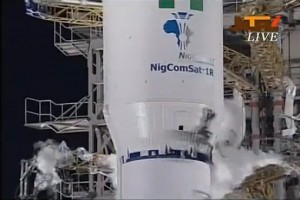Chinese satellites selling well in the developing world

 BEIJING -- After transforming the market for most commodities, cheap Chinese manufacturing is starting to leave a mark on the space sector too. China has sold low-price satellite technology to a host of developing countries including Pakistan, Brazil and Nigeria over the past few years. Sales are often politically motivated, with satellites sometimes traded directly for access to natural resources in other countries. Getting into the sector makes commercial sense as well, as global satellite launches are predicted to double in the next ten years. But technological problems and political barriers are likely to make it tough for China to expand its share of the commercial satellite market beyond the developing world.
BEIJING -- After transforming the market for most commodities, cheap Chinese manufacturing is starting to leave a mark on the space sector too. China has sold low-price satellite technology to a host of developing countries including Pakistan, Brazil and Nigeria over the past few years. Sales are often politically motivated, with satellites sometimes traded directly for access to natural resources in other countries. Getting into the sector makes commercial sense as well, as global satellite launches are predicted to double in the next ten years. But technological problems and political barriers are likely to make it tough for China to expand its share of the commercial satellite market beyond the developing world.
China launched its first satellite in 1970, with its first TV satellite following in 1986. But China's satellite technology lagged behind richer countries, and initial attempts to commercialize the sector were sometimes bizarre. One Chinese satellite was sent into space in 1993 carrying a diamond-studded medallion of Chairman Mao, which was to be sold to the highest bidder when then satellite returned to Earth. The satellite later crashed into the Pacific Ocean after going out of control.
The latest generation of Chinese satellites have a 15 year life-span, according to government reports, comparable with satellites produced in the US and Europe. China has gained experience in the sector, and now has 123 satellites in orbit, and three satellite launch facilities, which are expected to launch 30 satellites this year.

Only nine countries have the technology to launch satellites, and other nations hoping to do so have to look abroad for assistance. Russia leads the commercial satellite market, accounting for around half of global commercial launches in 2010. The US has previously launched commercial satellites for Italy, Denmark and Taiwan.
The total number of satellite launches worldwide will double in the next decade, according research by Euroconsult, a consultancy specialising in the sector. China is keen to grab a share of the market. "We aim to become a major player," the head of the state-owned Great Wall Industry Corp, the only Chinese company licensed to sell satellites to foreign countries, said in 2010.
Nigeria became the first country to buy a Chinese satellite and use China’s launch facilities in 2007. Since then, China has launched satellites for Brazil, Venuzuela and Pakistan, and has signed launch contracts with Turkmenistan and Bolivia. In terms of volume, China already has more than a ten percent share of the global commercial satellite market, according to Euroconsult.
“China’s strategy is to focus on emerging countries, who face constraints with financing,” Wei Li, a satellite industry analyst at Euroconsult, said. “China targets countries which don’t have any satellites in orbit,” he said. China has signed deals with at least three such countries last year, Li said.
Chinese satellites appeal to developing countries because of their price, often half as expensive as their US equivalents, according to Li. China also helps finance the satellite deals, and throws in other perks such as technology transfer and training. Bolivia received a loan from China’s Development Bank when it struck a satellite launch deal with China, as well as free training for its scientists.
Satellite sales are partly a used by China’s government to cement ties with key foreign countries. Past satellite contracts have been signed with Bolivia, Brazil and Nigeria, all major exporters of energy to China, and with Pakistan, China's main ally in Central Asia. “If you look carefully at these satellite deals, sometimes they are directly sold for natural resources,” Li said, citing a recent deal with Nigeria as an example.
Doubts remain about the reliability of Chinese satellite technology. The latest generation of Chinese satellite launching equipment compares well with foreign technology, though they remain “unproven,” since they have not been used for a long periods, Li said. The technology level of Chinese satellite payloads lags behind US and European technology by “five or ten years,” Li said. “The key reason is that the electronic components are less advanced in terms of accuracy,” he said. European companies have stepped in to fill the technological gap, demonstrated by China's launch of a communications satellite French company Eutelsat last year, with a European designed payload.
The US banned the sale of any satellite-based components to China in 1998. That means that any payload manufacturers using US-made components are unable to launch in China. “Some US companies want to launch in China, but according to the regulations they can’t do it,” Li said.
Purchases from the military sector account for over two thirds of the commercial satellite market, and China has little change of tapping that source of demand. “There’s no way western governments will buy military satellites from China,” Li said. That makes it tough for China to expand its share of the commercial satellite market beyond developing countries. “I think the political barriers are more important than the technical barriers,” Li said.
China plans to open its biggest ever satellite launch center in 2014, on the tropical island of Hainan. Bolivia, Belarus and Turkmenistan will have satellites launched in China in the next few years, and the Great Wall Industry Corp is likely to continue making deals with developing countries. “More and more emerging countries in Asia or in Africa who don't have satellites, and are keen to buy them,” Li said. “I still see potential for growth in sales.”
Pictures: Xinhua, Allafrica.com, Sina.
This post was originally published on Smartplanet.com